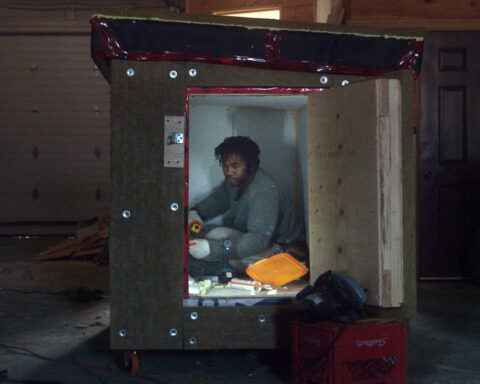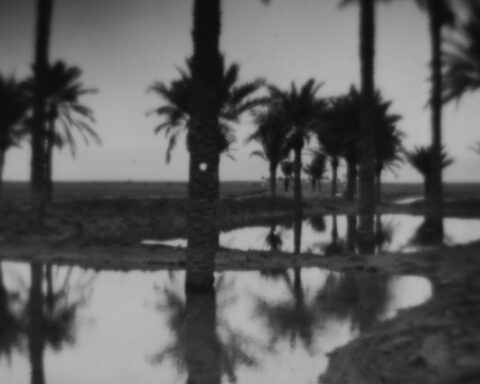Mimosas
(Spain/Morocco/France/Qatar, 93 min.)
Dir. Oliver Laxe
Starring: Ahmed Hammoud, Shakib Ben Omar, Said Aagli, Ikram Anzouli
Programme: Wavelengths (North American Premiere)
Apparently, the buzzword at Cannes for Oliver Laxe’s Mimosas was “Sufi western.” That gives some small idea of what to expect in the film, but, like Jonathan Rosenbaum’s dubbing of Jim Jarmusch’s Dead Man as an “acid western,” it risks trivializing the film’s merits with unnecessary exoticism. Mimosas doesn’t aspire to psychedelic or visionary immersion; rather, its subdued dramaturgy, strokes of absurdity, and subtle thematic development contribute to an experiment in contemplative cinema.
Shot in Morocco’s Atlas mountains, the film stars Shakib Ben Omar, who also starred in Laxe’s first feature, You Are All Captains, as a holy fool sent via taxi to rescue a doomed caravan transporting a dead sheik to his home in the medieval town of Sijilmasa for burial. Questions of life, death, and faith are asked but not answered as the sojourners attempt to traverse the mountains with their macabre cargo.
Familiar arthouse tropes abound—anybody familiar with Herzog’s Aguirre, the Wrath of God and any number of Ford or Hawks quest westerns (The Searchers, Red River) should recognise all the characters and many of the motifs. But there is originality here nonetheless. The film poses questions of faith and fate—of who is guiding the narrative and where that narrative is headed—not didactically as such, but as gravitational forces that anchor the film’s movement and imbue its long silences with cosmic significance.
Two epigraphs set the film’s existential, mystical, and playful tone: first, a lovely tromp l’oeil of a faded, peeling mural of a medieval town against a mountainous landscape, that plays under the opening credits; second, an oft-interrupted story about the Devil spying on God when he gives life to Adam. As it becomes clear that Ahmed, the group’s ostensible leader—who, it is implied, had probably intended on robbing the sheik before he went and died—has no idea how to get to Sijilmasa, the quest’s object becomes equated with that faded portrait. It’s as if the whole thing were a quest backwards in time, from Shakib’s taxi to the caravan’s horses through the elemental terrain to the ancient town.
Similarly, the ambiguous motives and goals of the caravan’s personnel persistently call to mind Shakib’s fable. Who is in charge here? Is it Ahmed? Shakib? Is it holy beneficence, or devilish greed? Could it be the dead sheik, who sometimes seems to move of his own volition? Or the mute daughter of another member of the caravan, whose abduction finally leads Ahmed and Shakib to Sijilmasa?
And what do the mimosas of the title have to do with anything? The mimosa derives its name from the Greek “mimos“—i.e. “mime”. Further, the mimosa flower is the source of DMT, one of the world’s most powerful psychedelic chemicals. (And of course there’s the mimosa cocktail, a fixture of hung-over brunches around the world.) The title seems to suggest something about the film’s relationship with reality—prosaically mimetic yet poetically visionary.
As the film proceeds by fits and starts towards its conclusion, its agnosticism becomes yet more pronounced. The ending bears a resemblance to the whole film—but in fast-forward. The final juxtaposition begins with Shakib, armed with a sword, and Ahmed leaving the city via horse and rushing into Sijilmasa to rescue the mute girl from being hanged by a small mob of toothless men. Just before we see what happens, the film cuts to a fleet of taxis driving through a rugged Sahelian landscape, closing the film.
Rehashing the metaphorical trip-back-in-time trope to bear uncomfortable echoes of both ISIS’s atrocities and the oft-flung epithets of “medieval” and “underdeveloped” to the Islamic world, the film seems to associate its experiment in narrative with the haphazard and chaotic course of history, pulled this way and that by conflicting actors with no final resolution, only the uneasy and violent coexistence of irreconcilable forces.
Mimosas screens:
-Saturday, Sept, 17 at 6:45 PM at Jackman Hall
TIFF runs Sept. 8 – 18. Please visit tiff.net for more information.











